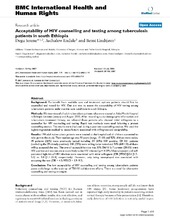| dc.contributor.author | Jerene, Degu | en_US |
| dc.contributor.author | Endale, Aschalew | en_US |
| dc.contributor.author | Lindtjørn, Bernt | en_US |
| dc.date.accessioned | 2008-03-27T14:32:03Z | |
| dc.date.available | 2008-03-27T14:32:03Z | |
| dc.date.issued | 2007-05-30 | eng |
| dc.Published | BMC International Health and Human Rights, 2007 7(4) | en |
| dc.identifier.issn | 1472-698X | |
| dc.identifier.uri | https://hdl.handle.net/1956/2622 | |
| dc.description.abstract | Background: To benefit from available care and treatment options, patients should first be counselled and tested for HIV. Our aim was to assess the acceptability of HIV testing among tuberculosis patients under routine care conditions in south Ethiopia. Methods: We interviewed all adult tuberculosis patients who were treated at Arba Minch Hospital in Ethiopia between January and August 2005. After recording socio-demographic information and tuberculosis treatment history, we referred those patients who showed initial willingness to a counsellor for HIV counselling and testing. Rapid test methods were used following a pretest counselling session. The results were disclosed during a post-test counselling session. We used the logistic regression method to assess factors associated with willingness and acceptability. Results: 190 adult tuberculosis patients were treated at the hospital and all of them consented to take part in the study. Their median age was 30 years (range, 15–68) and 52% of them were males. 49 patients (26%) were previously tested including 29 (59%) HIV positive. Of 161 patients (excluding the 29 already positive), 118 (73%) were willing to be tested and 58% (68/118) of those willing accepted the test. The overall acceptability rate was 35% (56/161). Fourteen (20.6%) were HIV positive and women were more likely to be HIV infected (p = 0.029). Unemployment and selfperceived high risk of HIV infection were associated with initial willingness (OR [95%CI]:2.6 [1.3– 5.5] vs. 5.0 [1.1–22.4], respectively). However, only being unemployed was associated with accepting the test (OR = 4.2; 95%CI = 1.9–9.3). Conclusion: The low acceptability of HIV counselling and testing among tuberculosis patients poses a challenge to the scale-up of TB/HIV collaborative efforts. There is a need for alternative counselling and testing strategies. | en_US |
| dc.language.iso | eng | eng |
| dc.publisher | BioMed Central | eng |
| dc.title | Acceptability of HIV counselling and testing among tuberculosis patients in south Ethiopia | en_US |
| dc.type | Peer reviewed | |
| dc.type | Journal article | |
| dc.rights.holder | Copyright 2007 Jerene et al; licensee BioMed Central Ltd. | |
| dc.identifier.doi | https://doi.org/10.1186/1472-698x-7-4 | |
| dc.identifier.cristin | 365399 | |
